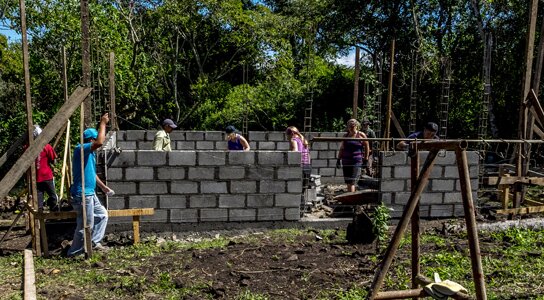Bridges to Community Canada (BTCC) is an organization that is focused on improving the lives of Nicaraguans in a sustainable and long-lasting way. We have a special focus on the farming communities in the department of Jinotega in the north of Nicaragua. These communities were deeply impacted by years of warfare throughout the 1970s and 1980s, leaving nearly 60% of the region’s population living in extreme poverty. Within this region, BTCC works closely with community leaders to help mitigate poverty in four distinct but overlapping program areas: HOUSING, WATER & SANITATION, EDUCATION, and ECONOMIC DEVELOPMENT.
A bit more about
What WE DO

HOUSING
The moment you arrive at your job site you immediately realize that you will make a difference in the family’s life. The family will show you their existing house and living conditions. Despite all the photos you might have seen, when you experience these conditions firsthand it can be overwhelming. The abject poverty is shocking! The homes have dirt floors and chimneyless wood fired cooking that results in the inherent smoke inside the dwelling. Combined with the lack of basic necessities such as beds and furniture gives you a sense of how desperate the situation is. Yet, despite these conditions the families you will meet are happy to see you and welcome you into their homes. They know from seeing the impact Bridges has had on their neighbours that they too will soon be living in a home with tiled floors and a proper roof to keep the rain and mud out. They know that soon their children will be in a much safer environment and that their lives will be enhanced by your presence. In four short days you will create memories that you will cherish for the rest of your life.

Water and Sanitation

Each day you take a drink of water from a tap or flush a toilet you take for granted basic amenities that many in the world do not have. Arriving in rural Nicaragua you will see people washing their clothes in each river that you pass. You will notice when you visit a home that an outhouse is as good as it gets for a bathroom. And inside the house you will notice the black soot covered walls caused by open fire cooking in an enclosed space. You soon realize that your role in constructing a bio digester will make a significant difference in both sanitation and in the health of the family.
The bio digester is a flush toilet constructed outside of the home that not only makes the human waste sanitary, it has other incredible benefits as well. Because of the climate in Nicaragua the waste that the families create can be turned into methane gas and organic materials. Once the bio digester is constructed Bridges installs a gas burner in the home. The gas produced from the waste is used for cooking, replacing the need to burn wood. It is clean, odourless and is produced naturally. The solid waste is also odourless and can easily be disposed of, or used as organic fertilizer. Better sanitation and no breathing in of smoke from within the home makes an immediate difference in the health of the family.

Education

A lack of transportation and government funding means getting an education is difficult in rural Nicaragua. Even when the children arrive at school, crowded conditions make it very difficult to learn, and studying at home is next to impossible with nowhere to sit down due to a lack of furniture and space. New classrooms make a difference in each child`s life by giving them an opportunity to study at a desk in a safe dry environment. The school also becomes a focal point of the community, giving the local people a place to gather when the school is not in use for educational purposes.
Education is a critical element in raising the standard of living in any country. In Nicaragua early education is critical because many of the older people are illiterate and depend on the younger generations to help. Young children often drop out of school to find work to help support the family. Better school facilities make a difference in providing a place for these older children to continue their education outside of work hours and on weekends
Economic Development
Partnering with the local community in development of economic sustainability helps make a difference in Nicaragua. Instead of simply giving money, Bridges works with local entrepreneurs and community leaders to create opportunities for employment ensuring that benefits derived are invested back into the local community.
Many projects considered require a level of investment and expertise currently unavailable in the community. Funds generated through the repayment of the loans the families take to build their new homes are invested in these new ventures. In addition Bridges provides advice and guidance on which investments to make that have potential sustainability. Bridges has made a difference by hiring an Agronomist to assess farming practices in the region and provide advice on ways to improve and increase crop yields.

